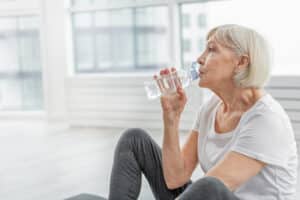Best Hot Weather Safety Tips and Information for Senior Citizens
Too much heat is dangerous for everyone. It is especially harmful for senior citizens. If you are caring for your elderly loved one, it is crucial to make sure they are getting relief from the hot weather quickly. They should never be out in the sun or heat for too long or they could faint or experience other heat-related issues.
Types of Heat-Related Issues

Elder Care Philadelphia, PA: Hot Weather Safety
Syncope is just one of the many heat-related issues. It is classified as sudden dizziness that happens when someone is active in the hot weather. If your elderly loved one is on heart medication, known as a beta-blocker, or if they just are not used to being outside in the hot weather for very long, they are much more likely to faint. If this happens, be sure your elderly loved one puts their legs up, goes into a cool place, and drinks a lot of water immediately. If you can’t be around to make sure your elderly loved one gets or does these things, you can hire elder care providers to do so.
Heat cramps are another heat-related issue. this is when there is a painfull tightening of the muscles in the legs, arms, or stomach. Generally, this happens when someone is hard at work in the hot weather. With heat cramps, the body may feel cool and moist. If your older loved one is experiencing this, get them in a shaded area and have them drink a lot of fluids which should be mainly water.
Heat edema and heat exhaustion are two other types of heat-related illnesses. Edema or swelling of the feet and ankles when someone gets too hot. If this happens they should put their legs up to reduce that swelling. Heat exhaustion is the warning that the body can no longer handle the hot weather.
Handling a Heat Stroke
If your elderly loved one has a heat stroke, they need medical attention immediately. Elderly adults that are living on their own may not remember to turn on the air-conditioning or the fans and their house. If this is what your elderly loved one does, they are at a much higher risk of getting heat stroke. Some signs of heat stroke include fainting, behavior changes, high body temperature, flushed or dry skin, and not sweating.
Things to Remember
Most senior citizens have a tough time dealing with heat. If the weather is 100 degrees Fahrenheit or higher your elderly loved one will have a bigger risk of getting a heat-related illness. They may become dizzy, confused, or nauseous. They may also have a headache or pain in their legs, arms, or stomach. If these things happen, make sure your elderly loved one that’s the medical attention they need. If you can’t take them to do this, don’t worry. You can hire elder care providers who can transport them to and from the emergency room or to their doctors.
If you or an aging loved one are considering Elder Care in Philadelphia, PA please contact the caring staff at True Direct Home Health Care today.
Sources
https://www.nia.nih.gov/health/hot-weather-safety-older-adults
- How Home Health Providers Offer Education Amidst Physical Health Changes - March 5, 2024
- Spring Activities for Seniors - February 21, 2024
- How to Help an Older Loved One with Cataracts? - February 6, 2024
